Charles E W Bean, Diaries, AWM38 3DRL 606/114/1 - June 1918 - Part 2
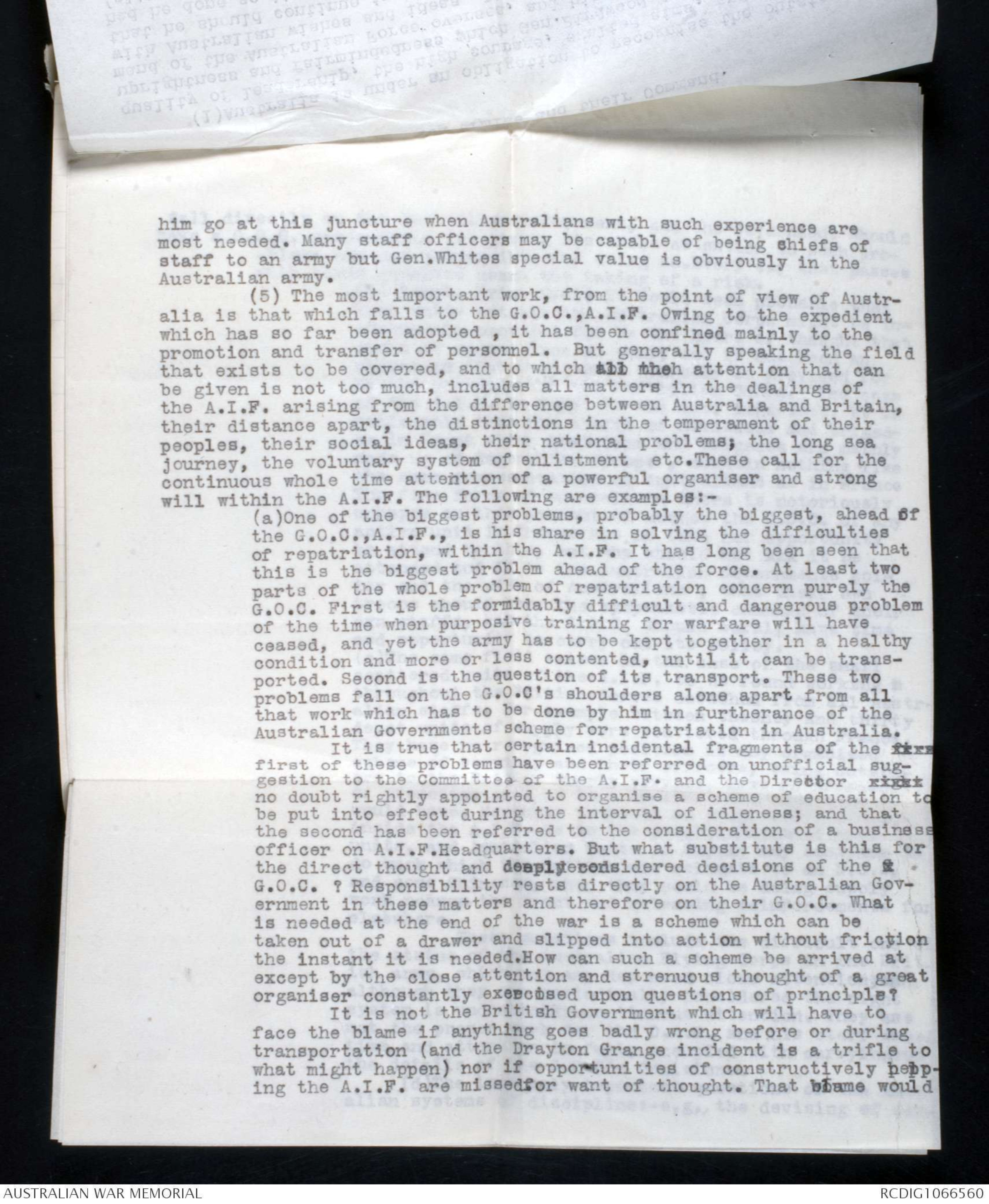
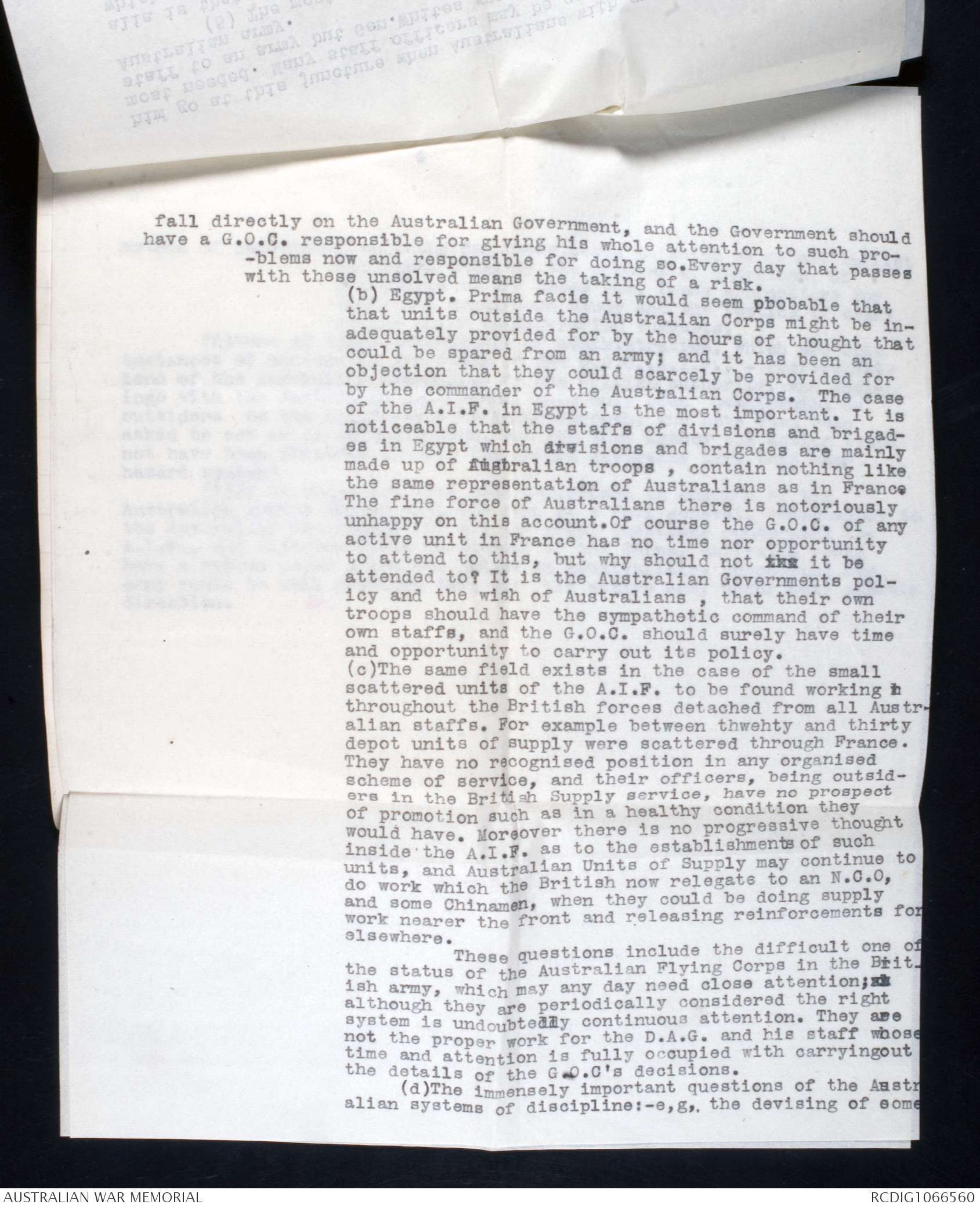
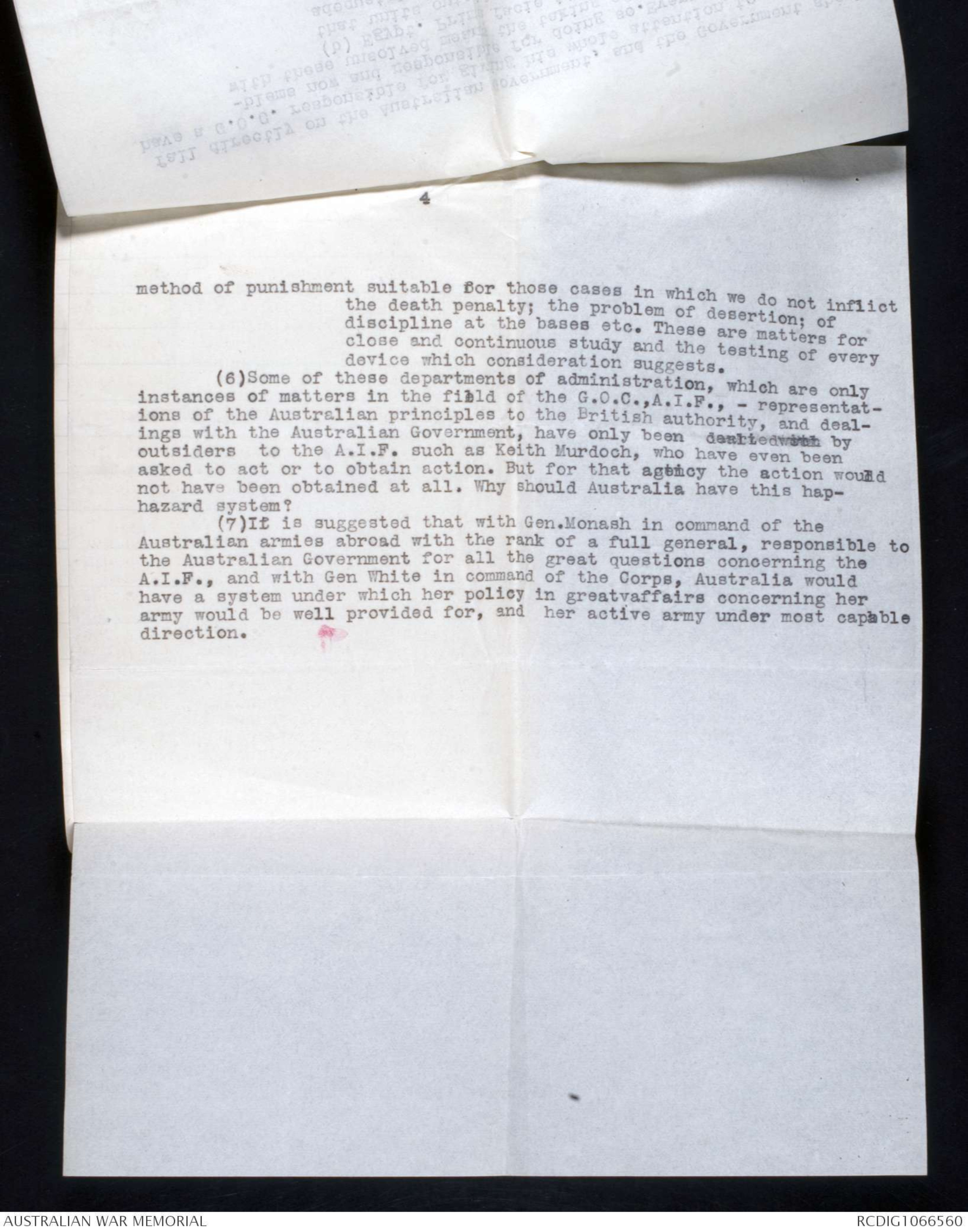
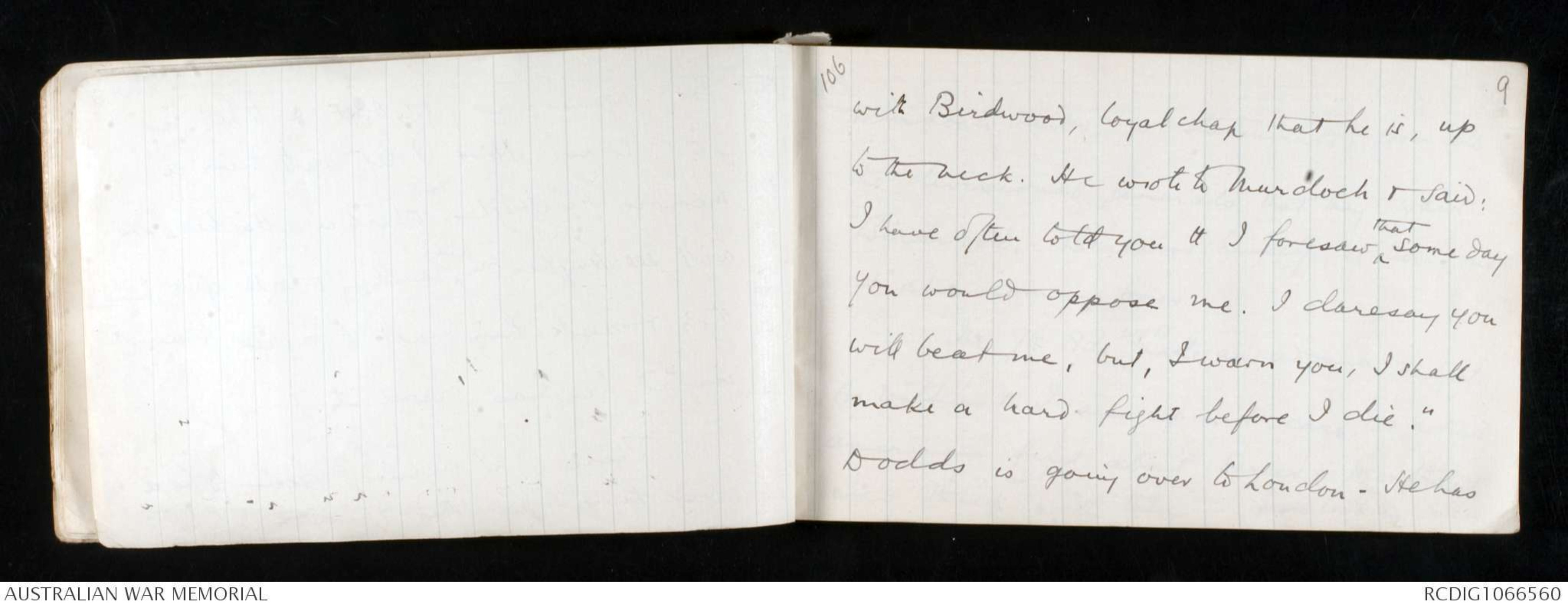
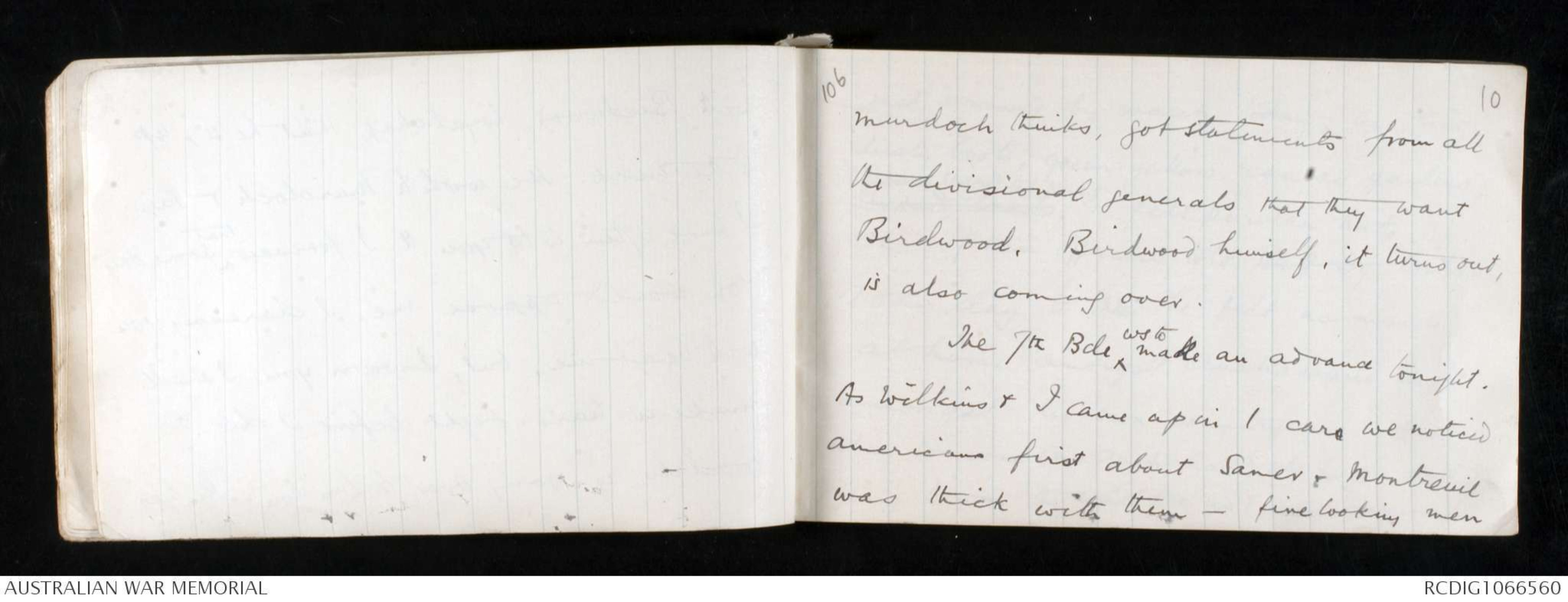
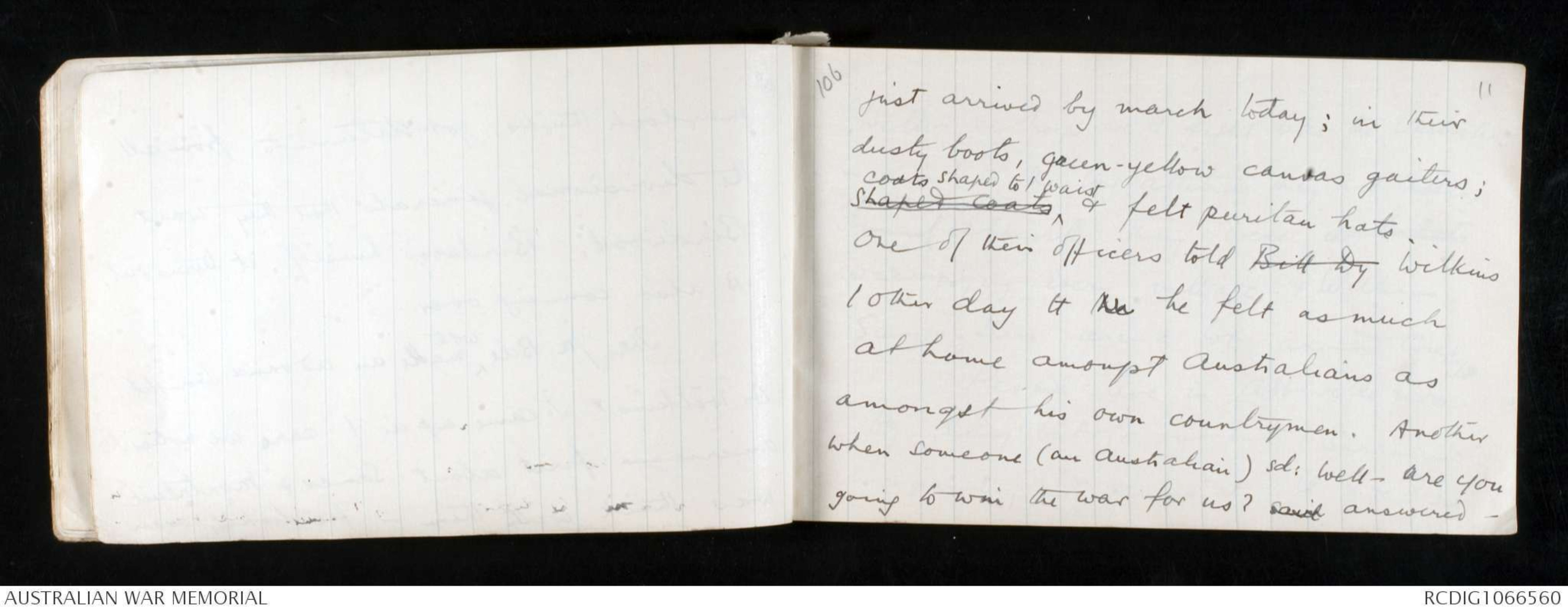
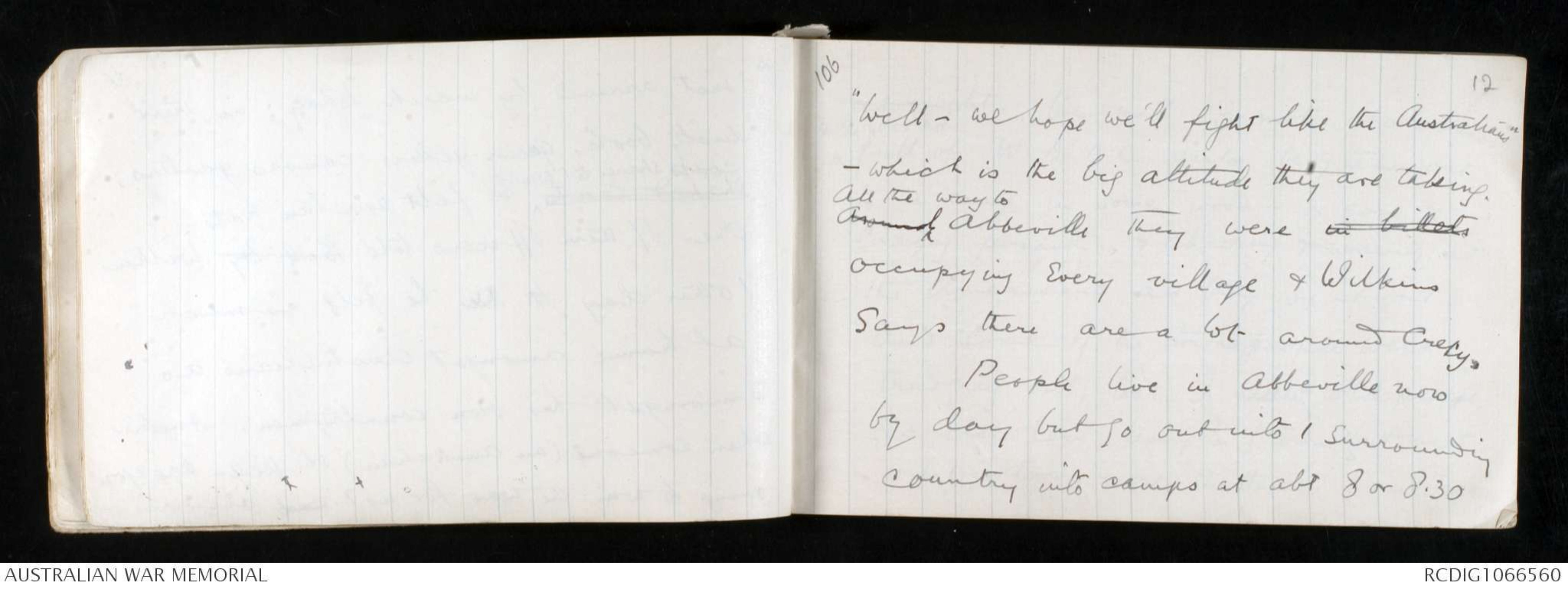
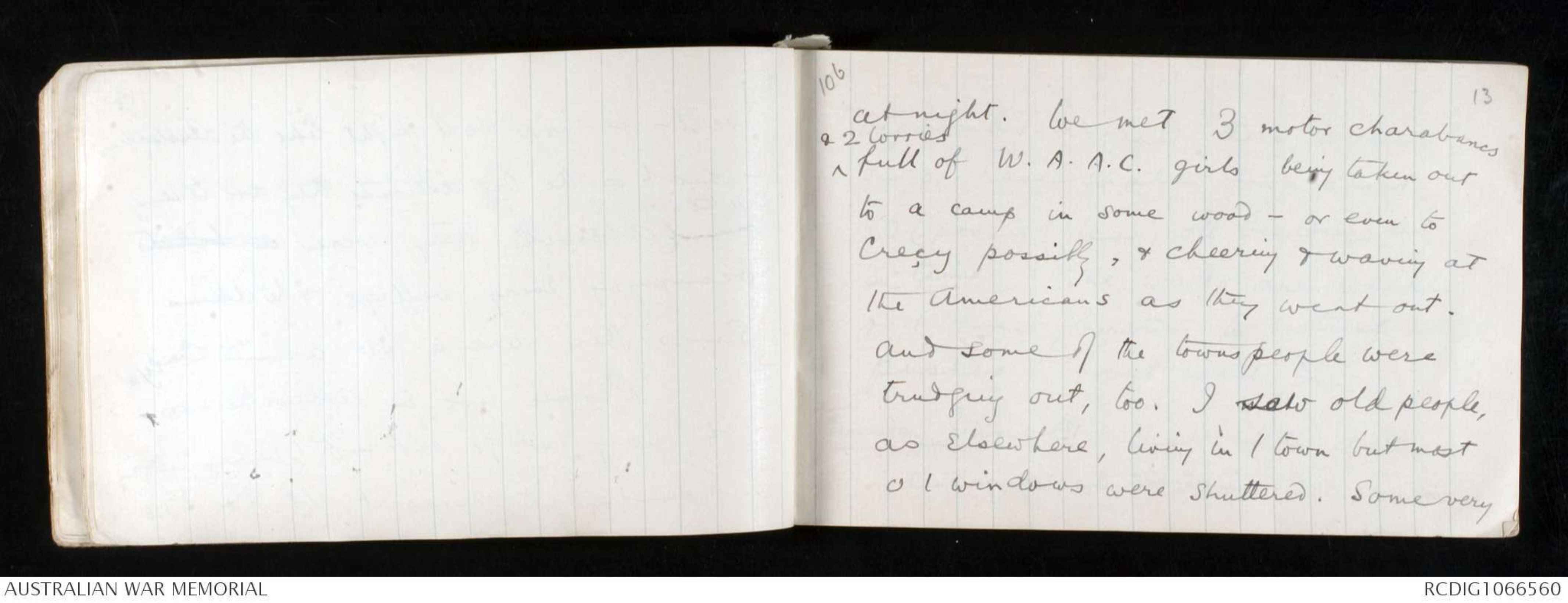
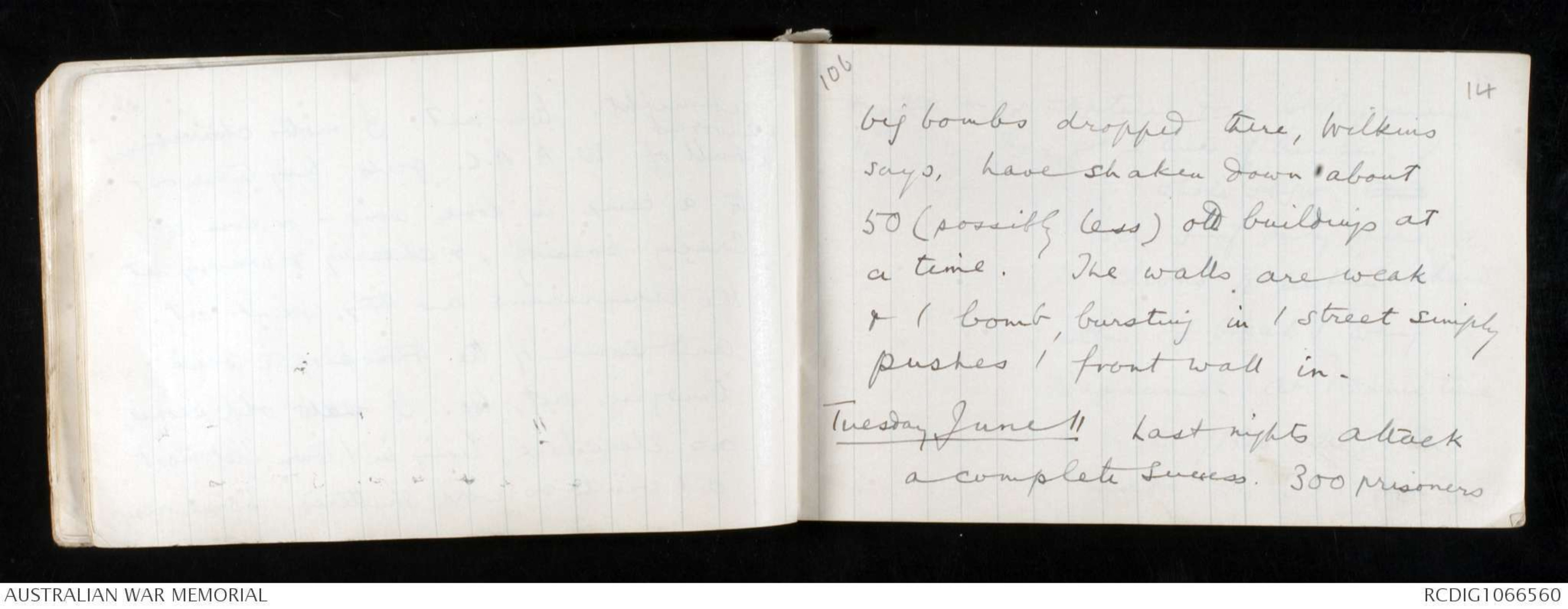
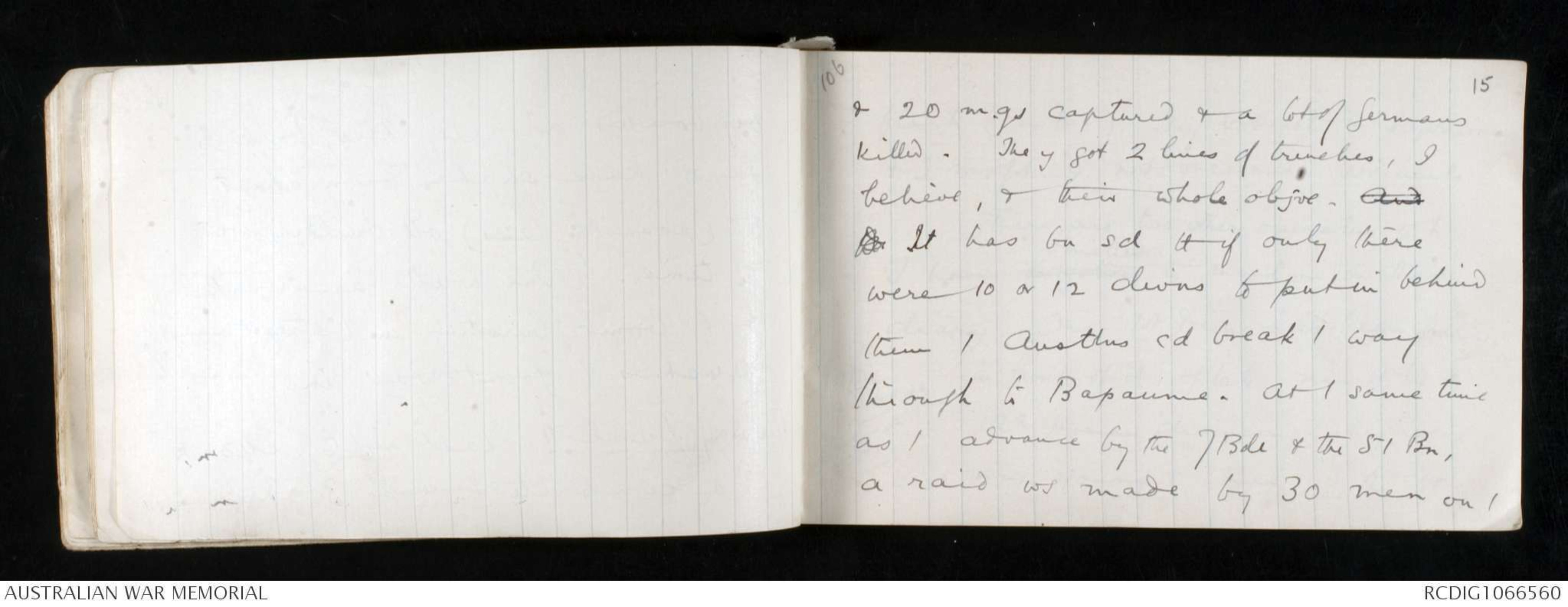
him go at this juncture when Australians with such experience are
most needed. Many staff officers may be capable of being chiefs of
staff to an army but Gen.Whites special value is obviously in the
Australian army.
(5) The most important work, from the point of view of Australia
is that which falls to the G.O.C.,A.I.F. Owing to the expedient
which has so far been adopted , it has been confined mainly to the
promotion and transfer of personnel. But generally speaking the field
that exists to be covered, and to which all theh attention that can
be given is not too much, includes all matters in the dealings of
the A.I.F. arising from the difference between Australia and Britain,
their distance apart, the distinctions in the temperament of their
peoples, their social ideas, their national problems; the long sea
journey, the voluntary system of enlistment etc.These call for the
continuous whole time attention of a powerful organiser and strong
will within the A.I.F. The following are examples:-
(a)One of the biggest problems, probably the biggest, ahead of
the G.O.C.,A.I.F., is his share in solving the difficulties
of repatriation, within the A.I.F. It has long been seen that
this is the biggest problem ahead of the forces. At least two
parts of the whole problem of repatriation concern purely the
G.O.C. First is the formidably difficult and dangerous problem
of the time when purposive training for warfare will have
ceased, and yet the army has to be kept together in a healthy
condition and more or less contented, until it can be transported.
Second is the question of its transport. These two
problems fall on the G.O.C's shoulders alone apart from all
that work which has to be done by him in furtherance of the
Australian Governments scheme for repatriation in Australia.
It is true that certain incidental fragments of the xxxx
first of these problems have been referred on official suggestion
to the Committee of the A.I.F. and the Director xxxx
no doubt rightly appointed to organise a scheme of education to
be put into effect during the interval of idleness; and that
the second has been referred to the consideration of a business
officer on the A.I.F.Headquarters. But what substitute is this for
the direct thought and deaplyeconsidered decisions of the x
G.O.C. ? Responsibility rests directly on the Australian Government
in these matters and therefore on their G.O.C. What
is needed at the end of the war is a scheme which can be
taken out of a drawer and slipped into action without friction
the instant it is needed.How can such a scheme be arrived at
except by the close attention and strenuous thought of a great
organiser constantly exercised upon questions of principle?
It is not the British Government which will have to
face the blame if anything goes badly wrong before or during
transportation (and the Drayton Grange incident is a trifle to
what might happen) nor if opportunities of constructively helping
the A.I.F. are missedfor want of thought. That blame would
fall directly on the Australian Government, and the Government should
have a G.O.C. responsible for giving his whole attention to such problems
now and responsible for doing so.Every day that passes
with these unsolved means the taking of a risk.
(b) Egypt. Prima facie it would seem pbobable that
that units outside the Australian Corps might be inadequately
provided for by the hours of thought that
could be spared from an army; and it has been an
objection that they could scarcely be provided for
by the commander of the Australian Corps. The case
of the A.I.F. in Egypt is the most important. It is
noticeable that the staffs of divisions and brigades
in Egypt which divisions and brigade are mainly
made up of Augbralian troops , contain nothing like
the same representation of Australians as in France
The fine force of Australians there is notoriously
unhappy on this account.Of course the G.O.C. of any
active unit in France has no time nor opportunity
to attend to this, but why should not xxx it be
attended to? It is the Australian Governments policy
and the wish of Australians , that their own
troops should have the sympathetic command of their
own staffs, and the G.O.C. should surely have time
and opportunity to carry out its policy.
(c)The same field exists in the case of the small
scattered units of the A.I.F. to be found working x
throughout the British forces detached from all Australian
staffs. For example between thwehty and thirty
depot units of supply were scattered through France.
They have no recognised position in any organised
scheme of service, and their officers, being outsiders
in the British Supply services, have no prospect
of promotion such as in a healthy condition they
would have. Moreover there is no progressive thought
inside the A.I.F. as to the establishments of such
units, and the Australian Units of Supply may continue to
do work which the British now relegate to an N.C.O,
and some Chinamen, when they could be doing supply
work nearer the front and releasing reinforcements for
elsewhere.
These questions include the difficult one of
the status of the Australian Flying Corps in the British
army, which may any day need close attention; xx
although they are periodically considered the right
system is undoubtedly continuous attention. They are
not the proper work for the D.A.G. and his staff whose
time and attention is fully occupied with carryingout
the details of the G.O.C's decisions.
(d)The immensely important questions of the Australian
systems of discipline:-e,g, the devising of some
4
method of punishment for those cases in which we do not inflict
the death penalty; the problem of desertion; of
discipline at the bases etc. These are matters for
close and continuous study and the testing of every
device which consideration suggests.
(6)Some of these departments of administration, which are only
instances of matters in the field of the G.O.C.,A.I.F., - representations
of the Australian principles to the British authority, and dealings
with the Australian Government, have only been dealtedwith by
outsiders to the A.I.F. such as Keith Murdoch, who have even been
asked to act or to obtain action. But for that agency the action would
not have been obtained at all. Why should Australia have this haphazard
system?
(7)It is suggested that with Gen.Monash in command of the
Australian armies abroad with the rank of a full general, responsible to
the Australian Government for all the great questions concerning the
A.I.F., and with Gen White in command of the Corps, Australia would
have a system under which her policy in greatvaffairs concerning her
army would be well provided for, and her active army under most capable
direction.
106
9
with Birdwood, loyal chap that he is, up
to the neck. He wrote to Murdoch & said:
I have often told you tt I foresaw ^that some day
you would oppose me. I daresay you
will beat me, but, I warn you, I shall
make a hard fight before I die."
Dodds is going over to London. He has
106
10
Murdoch thinks, got statements from all
the divisional generals that they want
Birdwood. Birdwood himself, it turns out,
is also coming over.
The 7th Bde ^ws to make an advance tonight.
As Wilkins & I came up in / cars we noticed
Americans first about Samer & Montreuil
was thick with them - fine looking men
106
11
just arrived by march today; in their
dusty boots, green-yellow canvas gaiters;shaped coats ^coats shaped to / waist & felt puritan hats.
One of their officers told Bill Dy Wilkins
/ other day tt xxx he felt as much
at home amongst Australians as
amongst his own countrymen. Another
when someone (an Australian) sd: Well - are you
going to win the war for us? said answered
106
12
"Well - we hope we'll fight like the Australians"
- which is the big attitude they are taking.Among ^All the way to Abbeville they were in billets
occupying every village & Wilkins
says there are a lot around Crecy.
People live in Abbeville now
by day but go out into / surrounding
country into camps at abt 8 or 8.30
106
13
at night. We met 3 motor charabancs
^& 2 lorries full of W.A.A.C. girls being taken out
to a camp in some wood - or even to
Creçy possibly, & cheering & waving at
the Americans as they went out.
And some of the towns people were
trudging out, too. I saw old people,
as elsewhere, living in / town but most
o / windows were shuttered. Some very
106
14
big bombs dropped there, Wilkins
says, have shaken down about
50 (possibly less) old buildings at
a time. The walls are weak
& / bomb, bursting in / street simply
pushes / front wall in.
Tuesday June 11 Last nights attack
a complete success. 300 prisoners
106
15
& 20 m.gs captured & a lot of Germans
killed. They got 2 lines of trenches, I
believe, & their whole objve. Andxx It has bn sd tt if only there
were 10 or 12 divns to put in behind
them / Austlns cd break / way
through to Bapaume. At / same time
as / advance by the 7 Bde & the 51 Bn,
a raid ws made by 30 men on /
 Sandy Mudie
Sandy MudieThis transcription item is now locked to you for editing. To release the lock either Save your changes or Cancel.
This lock will be automatically released after 60 minutes of inactivity.